#martin wilkins
Text
Brett and Martin
Brett and Martin
108 notes
·
View notes
Text




to celebrate another patriot rewatch and an update from @lyledebeast on ao3, here are my doodles!
#tavington is a horse girl#who’s a clingier drunk? T or W?? important Qs need As#i can’t get over that one scene when Tavington enters the tent to ask Wilkins about Martin and everyone starts to stand but not the American#nope he’s asleep#and Tavington’s just like. girl#so awesome they are so silly#william tavington#james wilkins#fanart#the patriot fanart#the patriot#the patriot 2000#revive the patriot fandom 2024
48 notes
·
View notes
Text
Power, Coercion, and Seduction
One of the most bizarre popular interpretations of The Patriot for me is the idea that Colonel Tavington forces Benjamin Martin to become involved in the Patriot war effort when he targets his family. This reading presents Martin's violence as merely a reaction to Tavington's choices. What it overlooks is not only that Martin has agency, but he has more than anyone else in the story. That agency should come with some responsibility; instead, all responsibility for Martin's violence within the narrative falls on the shoulders of a man who has to ask his general for permission to terrorize civilians in the film's third act. For all the pearl-clutching over Tavington killing surrendering soldiers first, he is also the only officer in the film to take prisoners, which only happens because General Cornwallis ordered him to give quarter. Do we not think he would have been torturing civilians for information about The Ghost before the militia was even trained if Cornwallis had allowed it?
People often use Tavington's desire for power to contrast him unfavorably with Martin, but Martin has no lack of power to produce a craving. Colonel Harry Burwell gives him orders when he puts him in charge of the militia, but he follows or does not follow them based on his whims. He allows his men to murder surrendering soldiers until his son and subordinate calls out his hypocrisy. His orders are to target supply trains, but he uses his force to rescue his own children and attempts to do the same for his friend, John Billings' family. When they fail, he gives his men a week's furlough and marries off his son, all while the Continental Army is planning a major engagement with the enemy. Either Martin has extremely poor communication with the Army, which the film never addresses, or he is simply a law unto himself. While Tavington languishes in impotence because his general will not allow him the brutal tactics that ultimately prove so effective, Martin is riding around doing exactly as he pleases, the Ron Swanson of the American Revolution.
He even makes plans to leave on the eve of battle after Gabriel's death, and all Burwell can do is plead with him in the words of his late wife to "stay the course," that his men need him and . . .
That's desertion, Harold. If one of your Regular officers tried that, you'd court martial him. Clearly, no one can make Martin do anything he does not want to do, least of all Tavington.
Since Tavington actually is subject to the authority of his superior officers, he is reliant on seduction and manipulation to get what he wants. In the case of Cornwallis, he offers the general glory free from consequence, a tall order that he definitely cannot fill . He gets what he wants from Captain Wilkins, who is under his orders, not by threatening him but by appealing to his desire to save face. Wilkins said those who stood against England deserved to die traitors' deaths; Tavington frames himself as giving him the opportunity to prove it, and it works. Burning the Patriot civilians in Pembroke Church is Wilkins' choice like granting Tavington carte blanche is Cornwallis's choice.
Coercion compels a person to do something against their desires; seduction gives a person permission to act on desires already present. When Tavington murders Thomas, he does not transform Martin from a pacifist to a man for whom violence is the only option in that moment. Martin already has a stockpile of weapons in waiting. He knows exactly where to find his French and Indian War buddies, and he has better battle plans than any of the Continental generals. When it comes to violence, Benjamin Martin stays ready.
I would argue that killing Martin's sons is an act of seduction as well as an incitement to violence, but as is the case with the other two men, these acts have only as much power as Martin gives them. The face-off in which Martin tells Tavington "Before the war is over I am going to kill you" and Tavington replies "why wait?" represents another attempt on Tavington's part to seduce Martin into violence, but this time he fails. In a later scene, cut from the theatrical release, he tries and fails to seduce Cornwallis into assuring his reward, and the two scenes share striking visual similarities. Both feature over the shoulder shots that position the two men far closer than they need to be for the purpose of conversation. The scene with Cornwallis is more on the nose. Tavington's shirt is open, his hair is loose, the orderly leaves without bidding as the two draw closer, almost as though similar scenes have played out between them recently that had very different endings to this one. But there is no lack of heat between Martin and Tavington at the gate of Fort Carolina, particularly compared to the single seduction scene that actually precipitates sex, between Ben and Charlotte. Yikes.
Neither Martin nor Cornwallis gives in to Tavington's seduction in these scenes, which should reinforce that they are in charge of their own behavior and thus culpable for their choices. And to the extent that blame for the British defeat falls on anyone but Tavington, it falls on Cornwallis. That seems fair enough; he is the general of the British Army in the southern colonies. But when the blame for Martin's poor choices somehow also falls on Tavington . . . the story loses me. But I suppose that is part of the fantasy for the film's intended audience. Martin gets the benefit of both ultimate authority over his actions and complete immunity to their consequences. Perhaps he should have run against George Washington given that these are the very qualities some Americans seem to look for in a president.
#the patriot#benjamin martin#william tavington#charles cornwallis#james wilkins#actions and consequences#seduction vs coercion
13 notes
·
View notes
Text
Since my friend and I are playing Bioshock 1, i wanted to share some of the things that have happened so far:
- We sat and watched the plane fully sink
- "OUGH?!" < her reaction to the giant Ryan statue
- Right off the bat she didn't trust Atlas and said his wife and child aren't real
- Every security bot is named Jeff
- The wrench is also Jeff(rey Bezos)
- We spent 30 minutes trying to get to Steinman because I forgot I has to throw the bombs at the debris blocking the entrance
- We went through 4 nitro splicers before I realized something wasn't right. I do this everytime. I literally replayed Bioshock like 2 weeks ago and forgot how to do that
- I've died more times in this playthrough than I ever have in Bioshock 1
- Keeps asking me if Atlas is evil, I keep telling her no and that he's my babygirl
- I've been spoon feeding her Atlas propaganda so hopefully she'll trust him by the end
- LOVES the little sisters, terrified of big daddys. She screamed the first time we had to fight one
- I tried to get the first bouncer stuck behind the register in the Medical Bay, but absolutely shredded him before I could
- The women were too stunned to speak
- We sat under the floor of the McCracken Crab trying to kill a Rosie. I died.
- I also hid under the floor of the Fisheries and smacked Splicers that walked overhead
- I got killed by a (different) Rosie like 5 times before I finally killed her
- Also ran from the third Rosie repeatedly before I finally killed him
- She chose target dummy for our first real plasmid
- I've only ever used it when losing control of the plasmids. So I've only used it once-
- Me: God I hate Andrew Ryan
Her: Bash his brains in
Me: *Hephaestus flashbacks* Oh I'm gonna
- Spider splicer: *angry screeching*
Me: New wife for you
Her: Great, thanks
- Hates it everytime I say "Snappies"
- I spent way too long looking for the final spider splicer before realizing I could take a picture of a dead one
- She did trust Peach Wilkins though (Somehow??)
- "I've got a really bad feeling about this" intensifies
- Yelled "THIS IS YOUR MAN⁉️" When Atlas walked out and almost missed Ryan's speech and the splicers bc of it
- Predicted the sub would blow up, but was shocked when it actually did
- I think she begrudgingly trusts Atlas now, his acting is peak
- I also went on a 2 minute rant about him and she made fun or me the entire time
- *finds a crawlspace full of Atlas posters*
Me: Oh my god, this is where I live!!
Her: NO
Me: With my Atlas posters and my.. Pistol bullets??
Her: N O !!
- #1 Langford stan (she's in love with her)
- Got jumpscared by the Houdini splicer that appears behind you (We both screamed)
- I was laughing bc his shadow was looming over us, then slowly turned around and we had a staring contest before I finally shot him in the face
- I've literally never seen him just sit there before?? He always disappeared as soon as I turned around. Wild
- She compared Langford writing the code on the window to 11307 from Danganronpa (iykyk)
- Cue disappointed sighing (Not really, I laughed really hard)
- This entire playthrough has just been me aggressively hitting on Atlas and her reevaluating our friendship
- Not even the posters are safe
- "Who is Atlas?"
Me: My husband
Her: UGH
- Saying "This is for me!!" every time I see an Atlas poster
- She is genuinely considering killing me
- Made me harvest a little sister to see what would happen 😔 We reloaded tho it's okay
- I've found so many secrets in this playthrough, including a vent that goes to a meat locker in the Farmers Market
- It felt like I was getting chased by everyone in Rapture while trying to make the Lazarus Vector
- I also (somehow) shot the big daddy in Langford's office while fighting splicers
- That was terrifying
- *Enters Fort Frolic* Me: It's about to get real silly
- I've been hyping up Cohen this entire time because I knew she would like him
- Unfortunately, she does
- She gagged at the "expectant mama" line
- Got jumpscared AGAIN by the splicer in the basement of Sinclair Spirits
- "SINCLAIR WHAT THE FUCK"
- I can never find the record store when I play Bioshock, this time was no different
- I gave up and went after Hector instead
- When we met Silas Cobb she yelled "KITTENS??"
- She agrees Silas is a discord mod
- We spent like 2 minutes straight trying to catch Hector and Silas
- I also got jumped by a bunch of splicers every time I tried to kill a bouncer
- She lost it at Cohen walking down the stairs
- "HIS GAY ASS WALK"
- I smacked Cohen after his speech and immediately ran
That's all so far, but we'll hopefully play some more this week!
#im just waiting for the reveal bc shes gonna judge me SO hard#i dont think she even knows who fontaine is#if we play bioshock 2 im gonna try to make her distrust sinxlait#>:)#maximun pain#atlantis.txt#bioshock#bioshock 1#atlas#jack wynand#sander cohen#julie langford#andrew ryan#silas cobb#martin finnegan#kyle fitzpatrick#hector rodriguez#bioshock disciples#peach wilkins#js steinman#frank fontaine#spoilers#bioshock spoilers
100 notes
·
View notes
Text

White House Meeting with civil rights leaders, June 22, 1963.
Collection JFK-WHP: White House Photographs
Series: Abbie Rowe White House Photographs
File Unit: White House Photograph Collection: Abbie Rowe White House Photographs: AR7993B
Image description: About 24 people standing outside the White House. Most of them are men in suits but there is one woman, who is wearing a summer hat. A few people have been identified: Front Row: Martin Luther King, Jr., Robert F. Kennedy, Roy Wilkins, Lyndon Baines Johnson, Walter P. Reuther, Whitney M. Young, A. Philip Randolph. Second Row Second From Left: Rosa Gragg. Top Row Third From Left: James Farmer.
#archivesgov#June 22#1963#1960s#civil rights#Martin Luther King Jr.#Robert F. Kennedy#Roy Wilkins#LBJ#Walter P. Reuther#Whitney M. Young#A. Philip Randolph#Rosa Gragg#James Farmer
57 notes
·
View notes
Text

The Flesh Eaters (1964) - VHS Cover
#the flesh eaters#martin kosleck#barbara wilkin#byron sanders#1960s movies#jack curtis#horror#trash classic#vhs#vhs cover
70 notes
·
View notes
Text
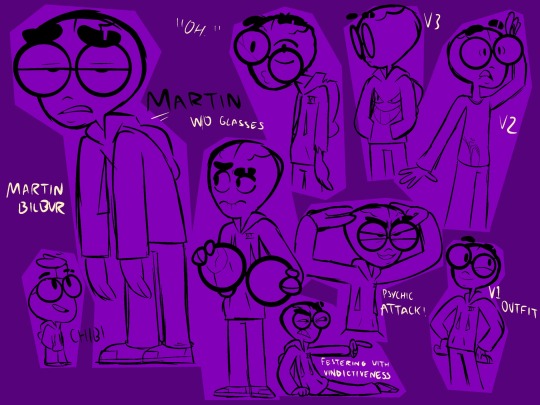

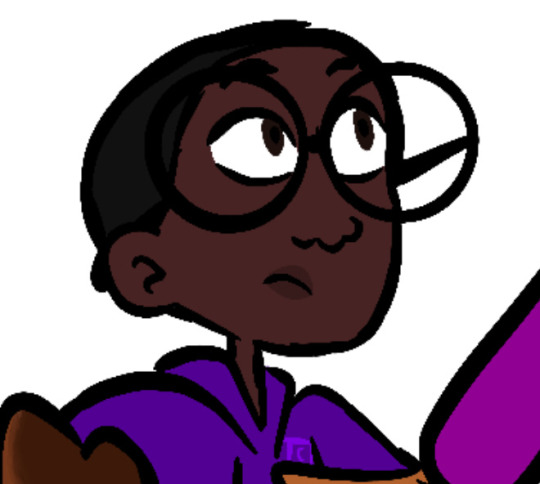
Martin Bilbert, the Purple Drewman
Be Inspired
Rank: A- (Major Character)
Visual Inspirations
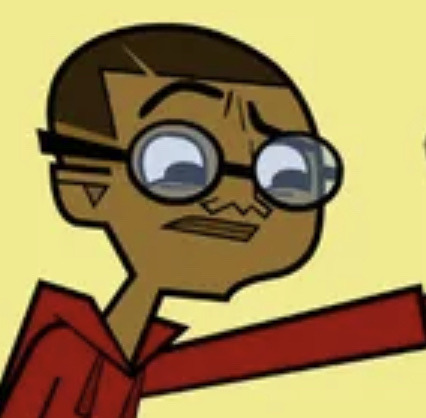
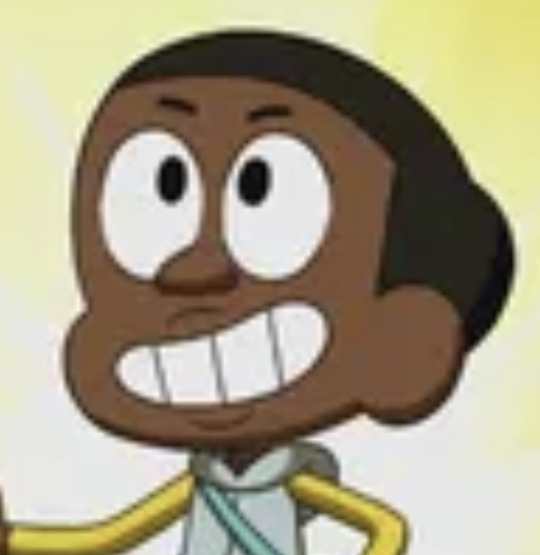
Other Character Bases
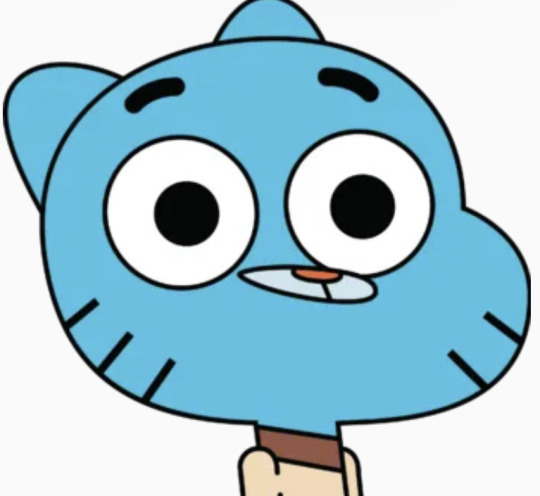

Deadpan Doom Magnet
(There I am, Gary, there I am!)
Ranking fifth place in the ICT sanity department is resident chew toy Martin. He’s the ideas guy and a creative genius, and the others generally treat him alright, but the show seems to go out of his way to beat him down. A lot. He doesn’t get much respect from people outside of ICT, either.
When the universe isn’t kicking Marty in the balls he’s not drawn with, he’s busy being a colossal nerd. A pop culture geek is a dangerous ally to have in a world where everyone’s a cartoon, especially when said geek is petty, vindictive, and has every reason to turn the universe’s rules upside down.
Fun Facts



Martin is visually a rough caricature the series creator. He is entirely distinct from Yours Truly, the actual in-series version of him/me, and gets no preferable treatment as a result of this aside from appearing on the channel/account picture. Quite the opposite, really.
Martin (purple) and Geneva (magenta) are the only major characters from Season One aside from Bridgette (beige) and Crimson to change colors in development. Specifically, they swapped colors. Subsequently, Martin is one of several characters to change names in development, originally being known as “Gene”.
Martin’s name is a play on “purple martin”, a type of songbird.
Martin’s surname is a play on “bilberry”.
Martin does have hair, it’s just hard to tell due to the art style.
Martin/Gene’s first personality that was ultimately scrapped for both RS and ICT had a far more rascally and snide attitude reminiscent of Trixie.
Martin generally takes his treatment in stride, but if a person goes out of their way to inconvenience him, he will actively hope for and partake in their demise.
Martin’s my self-insert, and I’ll make him suffer as much as I want to!
#dullsville#it’s color theory#color theory#ict#Martin Bilbert#Purple#total drama#td cameron#cameron wilkins#craig of the creek#craig williams#the amazing world of gumball#gumball watterson#avatar the last airbender#sokka#original character#character design#character page
21 notes
·
View notes
Text
A Storm for Christmas (2022)

1:1 Episode 1
I’m seeing some familiar actors to when I watched Home for Christmas because we’re in Norway again baby! The Oslo International Airport to be specific, and all the flights are grounded due to a nasty snowstorm. We follow various travelers with a myriad of final destinations (though none from Oslo because they could just leave the airport) and the reasons they are traveling and some struggles. There’s kind of a ton of distinct characters with parallel plot lines (we have already had some overlap), so I might not talk about any characters at all and just go vibes. Because rn the vibe is frantic. But I’m very into it.
1:2 Episode 2
There are even more characters now so I’m glad I didn’t try to talk about specifics in the first episode. But I do think we have the set-up for the rest of the season from something a character said about writing an album about 12 different people at the airport. I honestly don’t know how many plot lines we have at this point because I don’t remember most of their names, but I’m also not trying to. The jerking around has me hooked. Also, I don’t usually include quotes or conversations, but I’m gonna be thinking about this one for a while.
What happened between you and your mother?
She prefers the person she wishes I was to the person I am.
1:3 Episode 3
So. By the end of this episode, we are halfway through the season. I still have no idea what at least half the characters’ names are or how this is going to all come together because it keeps getting more chaotic. We didn’t get new central characters in this episode (thank the gods) but some side characters, yes. Also, some of the groups are fracturing and mingling with others, which will definitely make things even more interesting.
1:4 Episode 4
Wow. What a shift. Things were getting grim at the end of the previous episode and they have swung the opposite direction. People are being kinder to each other and overall less grumpy in general. Still unsure that anyone will make it to their destination before Christmas because we are hours away from Christmas Eve. I’m also considering seeking out Norwegian shows that are unrelated to Christmas because I think I might be a fan of those as well.
1:5 Episode 5
Y’all what a f****** episode. Like, I am speechless by the absolute highs and lows in this episode happening simultaneously but with separate characters. There is only one character that I’m not really sure about, like why that story is being told, but all of the others I can see where they’re going with it. Also Lasso the dog’s storyline is bit weird. Like, who boards a dog on an airplane and then doesn’t claim it?
1:6 Episode 6
What an ending. Everything got tied up, but there were even more surprises. I would say mostly happy for everyone, although the happy can be bittersweet for some. Overall, for the season, 5 stars.
#christmas#review#netflix#2022#christmas shows#christmas show#a storm for christmas#dennis storhøi#maibritt sarens#jan gunnar røise#jon øigarden#ariadna cabrol#valter skarsgård#ravdeep singh bajwa#sus wilkins#ibrahim faal#talia lorentzen#iker pedraza proskauer#thea sofie loch næss#j.v. martin#damian cecere#ida elise broch#Alexandra rapaport#evelyn rasmussen osazuwa#hanna ardéhn#line verndal#oscar jean#camilla klaudiussen#kalle hennie#kyrre hellum
1 note
·
View note
Text
youtube
Devoradores de carne! O cult "The flesh eaters", um dos primeiros filmes gore
#The flesh eaters#gore movies#gore#Jack Curtis#Barbara Wilkin#horror movies#Byron Sanders#Martin Kosleck#ray tudor#Barbara Wilson#Ira Lewis#Arnold Drake#sci fi movies#Youtube
1 note
·
View note
Text
DVD review: “Joe 90” (1968 – 1969)
“Joe 90” (1968 – 1969)
Television / Sci-Fi
Thirty Episodes
Created by: Gerry and Sylvia Anderson
Featuring: Keith Alexander, Sylvia Anderson, Rupert Davies, Gary Files, Len Jones, Martin King, David Healy, Jeremy Wilkin, Liz Morgan and Shane Rimmer
Released recently on DVD is the 1970s science fiction series “Joe 90” (1968 – 1969), one of the many series created by Gerry and Sylvia…

View On WordPress
#David Healy#dvd#dvd drama#dvd new zealand#dvd review#DVD reviews#dvd television#DVDReviews#Gary Files#gerry Anderson#Jeremy Wilkin#Joe 90#Joe 90 dvd#Keith Alexander#Len Jones#Martin King#Rupert Davies#Shane Rimmer#Sylvia Anderson
0 notes
Text
youtube
1 note
·
View note
Text
Remembering Bayard Rustin: The Unsung Hero of the Civil Rights Movement
written by Levi Wise Kenneth Catoe Jr.
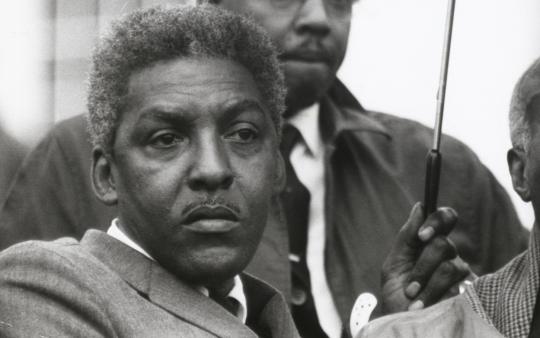
August 1, 2024 - Growing up as a Black boy in Paterson, NJ, and attending Roman and Irish Catholic Parochial schools, Black history was not very familiar to me. I grew up in a religious Southern Baptist family and participated in the church choir. In this context, Martin Luther King, Jr., was all that I knew about Black history until I became a teenage Madonna fanatic. Ironically, Madonna made me aware of Black activists and radicals such as Nina Simone, Jean-Michel Basquiat, James Baldwin, and Bayard Rustin. Bayard Rustin was an African American activist who believed in civil disobedience. Rustin felt that Black people should deliberately break unjust laws but do it non-violently to bring about change and this would play a key role in the Civil Rights movement. He also advocated for LGBTQ rights. Rustin moved to Harlem in 1937 and began studying at City College of New York. It’s interesting to note that at the time CCNY was an all-male college once regarded as ‘Jewish Harvard’ which did not accept Black men—Rustin was an unusual exception. While Rustin was at CCNY he became involved in efforts to defend and free the Scottsboro Boys, nine young black men in Alabama who were accused of raping two white women. Activism for Rustin was something that came naturally. He later became a mentor to Martin Luther King.
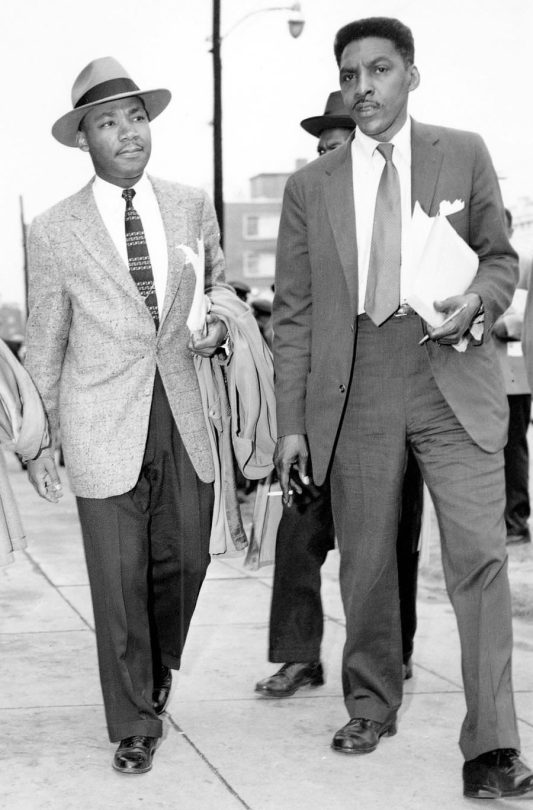
Rustin is one of my all-time idols. I have been enamored of him since I learned about him, so I was excited to attend an event dedicated to his life and legacy at the Schomburg Center for Research in Black Culture, “Between the Lines: Bayard Rustin, A Legacy of Protest and Politics.” The event was a conversation between Michael G. Long and Jafari Allen, who edited the book of the same name. Their exchange sparked many revelations and I left the event more aware than when I entered. I felt so much pity for the life that Rustin had to live, including the attack on his character that was rallied against him by other Black people and the distance that Martin Luther King placed between himself and Rustin out of fear of people assuming that he was also gay. I also learned that it was Coretta Scott King who introduced King to Rustin. Scott-King met Rustin during her college years as a fellow activist who practiced civil disobedience. She would ultimately introduce her husband King to civil disobedience tactics. Rustin recalled that his first time meeting King he was strapped with a handgun and that he never traveled without his gun. It was Rustin who told King that if he represented civil disobedience he would have to be willing to put away his firearm, which eventually he did. Nevertheless, this raises the question, who was King really? The “I Have A Dream” pacifist or the “Beyond Vietnam” radical? We will never truly know.
All in all what I did learn was that according to Rustin, King had no idea how to organize an event. Instead, it was Rustin who developed the blueprint for King’s early Civil Rights movement, at least until the day that King removed Rustin from his inner circle.
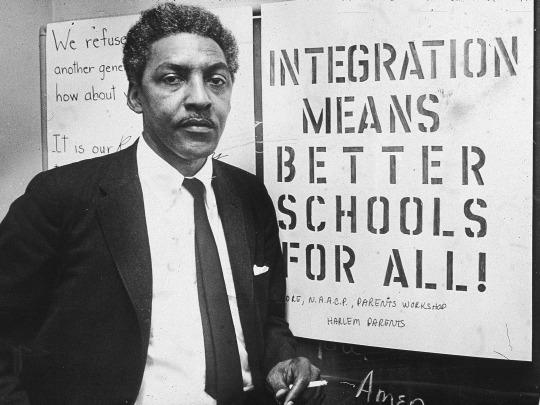
Nevertheless, Rustin returned to organize the March on Washington, despite everything leveled against him by Adam Clayton Powel and Roy Wilkins. Someone noted during the discussion that “it’s funny how karma works given the fact that nobody remembers Wilkins's legacy in comparison to the sudden interest in Rustin.'' If I remember correctly, the comment was made by the moderator, NYU professor Dr. Jarafi Allen, based on the fact that the venue was standing room only, or that the Hollywood lens is now fixated on Rustin’s story, with an Academy Award-nominated movie based upon his life currently in theaters. Wilkins has not received the same interest from Hollywood, perhaps indicating that he is less marketable in the mainstream. Meanwhile, Rustin’s role as an activist for the LGTBQ community is also important for newer generations. Until recently, this legacy and all that he accomplished was invisible, but he has since become a symbol of the “others” and most notably the “forgotten others”. While in his lifetime he was shunned, rallied against, and betrayed by those that he benefitted, history has allowed his legacy the final word.
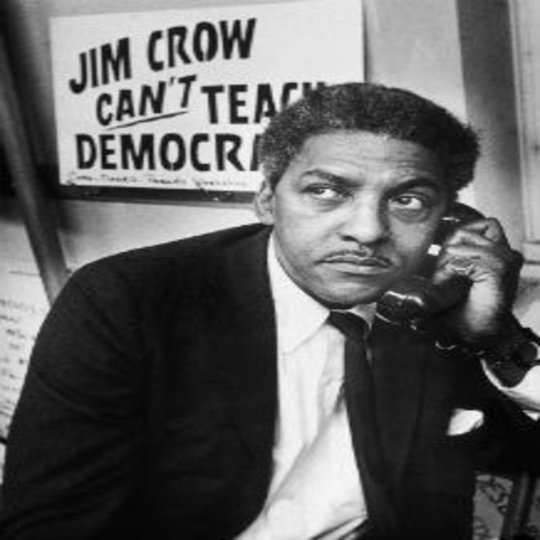
#black literature#black history#black tumblr#critical race theory#black theme#black entrepreneurship#new york
128 notes
·
View notes
Text
I'm doing my bi-yearly rewatch and reflecting on all the subtle and unsubtle ways everyone in The Patriot is so incredibly generous to Martin. See Tavington's questions to Wilkins once The Ghost's true identity has been exposed.
"Does he have family? Where would he hide his children?"
"Hide" is such an interesting word choice here. "Hide" indicates that there has been some effort at concealment, that the precious object has been placed in a location the ill-intentioned would not expect. But here Tavington is asking one of his own Loyalist officers where the kids are, and the man's first guess is spot on.
Martin "hides" his children with their nearest and most prominent relative like I "hide" my ice cubes in the freezer.
#the patriot#where would martin dump his children wilkins?#where's the most convenient place he could possibly abandon them?#james wilkins#william tavington
8 notes
·
View notes
Text
i’ve had this long list of td surname headcanons (and i guess some of them are nationality headcanons) for a while and haven’t done much about them, so…
here are each generation’s surnames! (except for rr since i’m not too confident about them)
gen 1:
harold norbert cheever doris mcgrady V
cody emmett jameson anderson
lindsay tyson
noah könig (german)
eva barta (czech)
izzy clark
owen fraser
trent evans-grant
gwen kennedy
heather ryeo
bridgette summers
leshawna simelane (south african iirc)
beth spring
devon ‘dj’ joseph
alejandro burromuerto (spanish)
sierra kauffman (german)
tyler wilson
ezekiel miller
courtney cortez (spanish, or from somewhere where they speak spanish primarily)
duncan butcher
katie wan (malaysian)
sadie peterson (originally was gonna give her a romanian surname but here is peterson)
justin kāne (hawaiian)
geoff jasper
gen 2:
josef ‘jo’ kaczmarek (Polish)
brick macarthur
anne-maria chahuán (chilean)
michele ‘mike’ russo
cameron corduroy wilkins
rudolph ‘lightning’ jackson
staci sterling
zoey gates
dawn oakwood
scott brackin (irish)
dakota milton
sam stevens
beverly ‘b’ jones
gen 3:
ella ito-courtemanche (japanese and french)
scarlett montgomery
max mayhem (yes. i’m actually giving him that as his surname. get sillyed)
jasmine reynolds
shawn tremblay
dave korrapati (indian, more commonly in telugu-speaking areas)
sky sanderson (i was a bit uhm. stuck with this one. i looked up ‘cree surnames’ but found only three. i went for this one but i’m still uncertain.)
amy martin
samantha ‘samey’ martin
topher mccann
rodney rogers
sugar silo
beardo mbomio (equatoguinean)
leonard howe
gen 4:
nichelle ladonna (italian)
bowie davis
emma fletcher
julia hartwell-hughes
priya khan (indian)
millie carter
chase boonmee (thai. it means ‘reliable, generous, loyal’. ironic)
raj ghosh (indian)
wayne watterson
mary-kate ‘mk’ yí (chinese. in honour of fai yí, my beloved)
damien reid
hezekias ‘zee’ guzman (argentinian (it means ‘good man’ which is what he is!!!))
rhinffrew ‘ripper’ bowen (welsh (WELSH RIPPER REAL))
caleb garcia (hispanic)
axel sanchez-guðmundsdóttir (hispanic(?) and icelandic. yes, apparently ‘axel’ is an icelandic name!)
#ok i kept two of the comeback surnames. i actually really like them. bite me.#(i hope i used that phrase correctly)#btw geoff’s surname is based off this really nice person from my school i met during our oliver! production!#he doesn’t go to my school anymore because he graduated. i hope he’s doing well#i’m realising now that priya and raj’s surnames are both surnames of my classmates.#like i genuinely didn’t name them after these people. this is a total coincidence#IF there is any mistakes in this please correct me. a lot of these are taken from websites#(i made up the first gen surnames first…. i actually looked up ‘canadian surnames’ LMAO)#oh yeah i named noah after someone i know too (my german exchange partner). also he’s like. a king#I LOVE NAMING THINGS#IT’S SO FUN#naming characters is one of my favourite parts of creating characters#(although i accidentally named two octuplets characters after like. people idk.)#((and one character was nearly named after a WWI war general!))#ANYWAYS#total drama#td#I AM NOT TAGGING ALL THOSE CHARACTERS
47 notes
·
View notes
Text

Lefty Frizzell - Long Black Veil (1959)
Danny Dill / Marijohn Wilkin
from:
"Long Black Veil" / "When It Rains the Blues" (Single)
"Country Music: The Soundtrack" (2019)
(5 Disc Boxset | Disc 2)
Counrty | Ballad
JukeHostUK
(left click = play)
(320kbps)
Personnel:
Lefty Frizzell: Vocals
Grady Martin: Guitar
Harold Bradley Guitar
Don Helms: Steel Guitar
Marijohn Wilkin: Piano
Joseph Zinkan: Bass
Buddy Harman: Drums
Produced by Don Law
Recorded:
@ The Bradley Film and Recording Studio
in Nashville, Tennessee USA
on March 3, 1959
Released:
on April 20, 1959
Columbia Records
In 2019, Frizzell's version of "Long Black Veil" was selected by the Library of Congress for preservation in the National Recording Registry for being "culturally, historically, or aesthetically significant"
11 notes
·
View notes
Text
As our situation had become more complex, Martin's speeches had become simpler and more concrete. As I remember, he spoke very simply that evening on the work of the Southern Christian Leadership Conference, what had been done, what was being done, and the enormity of the tasks that lay ahead. But I remember his tone more than his words. He spoke very humbly, as one of many workers, speaking to his co-workers. I think he made everyone in that room feel that whatever they were doing, whatever they could do, was important, was of utmost importance. He did not flatter them -- very subtly, he challenged them, challenged them to live up to their moral obligations. The room was quite remarkable in the most serious sense of that weary phrase, profoundly honored.
And yet -- how striking to compare his tone that night with what had been not many years before! Not many years before, we had all marched on Washington. Something like two hundred and fifty thousand people had come to the nation's capital to petition their government for a redress of grievances. They had come from all over the nation, in every condition, in every conceivable attire, and in all kinds of vehicles. Even a skeptic like myself, with every reason to doubt that the petition would, or could, be heard, or acted on, could not fail to respond to the passion of so many people, gathered together, for that purpose, in that place. Their passion made one forget that a terrified Washington had bolted its doors and fled, that many politicians had been present only because they had been afraid not to be, that John Lewis, then of SNCC, had been forced to tone down his speech because of the insuperable arrogance of a Boston archbishop, that the administration had done everything in its power to prevent the March, even to finding out if I, who had nothing whatever to do with the March as organized, would use my influence to try to prevent it. (I said that such influence as I had, which wasn't much, would certainly not be used against the March, and, perhaps to prove this, I led the March on Washington from the American Church, in Paris, to the American Embassy, and brought back from Paris a scroll bearing about a thousand names. I wonder where it is now.)
In spite of all that one knew, and feared, it was a very stirring day, and one very nearly dared, in spite of all that one knew, to hope -- to hope that the need and the passion of the people, so nakedly and vividly, and with such dignity revealed, would not be, once again, betrayed. (The People's Republic of China had sent a telegram in our support, which was repudiated by Roy Wilkins, who said, in effect, that we would be glad to accept such a telegram on the day that the Chinese were allowed to petition their government for redress of grievances, as we were petitioning ours. I had an uneasy feeling that we might live to hear this boast ring somewhat mockingly in our ears.)
But Martin had been quite moving that day. Marlon [Brando] (carrying a cattle prod, for the purpose of revealing the depravity of the South) and Sidney Poitier and Harry Belafonte, Charlton Heston, and some others of us had been called away to do a Voice of America show for Ed Murrow, and so we watched and listened to Martin on television. All of us were very silent in that room, listening to Martin, feeling the passion of the people flowing up to him and transforming him, transforming us. Martin finished with one hand raised: "Free at last, free at least, praise God Almighty, I'm free at last!" That day, for a moment, it almost seemed that we stood on a height, and could see our inheritance; perhaps we could make the kingdom real, perhaps the beloved community would not forever remain that dream one dreamed in agony. The people quietly dispersed at nightfall, as had been agreed. Sidney Poitier took us out to dinner that night, in a very, very quiet Washington. The people had come to their capitol, had made themselves known, and were gone: no one could any longer doubt that their suffering was real. Ironically enough, after Washington, I eventually went on the road, on a lecture tour which carried me to Hollywood. So I was in Hollywood when, something like two weeks later, my phone rang, and a nearly hysterical, white, female CORE worker told me that a Sunday school in Birmingham had been bombed, and that four young black girls had been blown into eternity. That was the first answer we got to our petition.
The original plans for the March on Washington has been far from polite: the original plan had been to lie down on the airport runways, to block the streets and offices, to immobilize the city completely, and to remain as long as we had to, to force the government to recognize the urgency and the justice of our demands. Malcolm was very caustic about the March on Washington, which he described as a sell-out. I think he was right. Martin, five years later, was five years wearier and five years sadder, and still petitioning. But the impetus was gone, because the people no longer believed in their petitions, no longer believed in their government. The reasoning behind the March on Washington, as it eventually evolved -- or as it was, in Malcolm's words, "diluted" -- was that peaceful assembly would produce the best results. But, five years later, it was very hard to believe that the frontal assault, as planned, on the capitol, could possibly have produced more bloodshed, or more despair. Five years later, it seemed clear that we had merely postponed, and not at all to our advantage, the hour of dreadful reckoning.
Martin and Andrew and I said good night to each other, and promised to meet in New York.
--James Baldwin, from To Be Baptized, one of two essays collected in his book, No Name In The Streets.
8 notes
·
View notes